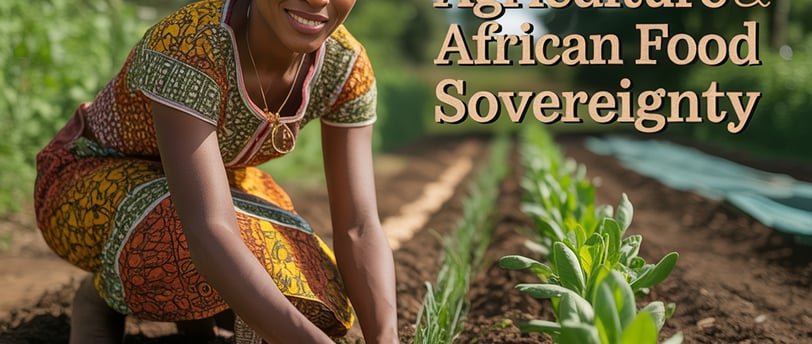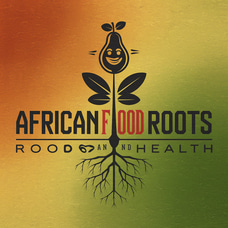Regenerative Agriculture & African Food Sovereignty”:
Explore how regenerative agriculture is helping African communities restore soil health, reclaim ancestral food systems, and achieve true food sovereignty. Learn why modern farming is depleting our nutrients and how traditional African methods offer a path to healing the land, our diets, and our cultural identity.
6/28/20253 min read


🌿 Regenerative Agriculture & African Food Sovereignty: Reclaiming Our Roots, Resisting False Solutions
🌍 Introduction: The Land Remembers
For millennia, African farming systems worked with nature—not against it. From the agroforests of West Africa to the terracing systems of Ethiopia, our ancestors cultivated abundance through biodiversity, reciprocity, and deep ecological knowledge.
But today, our food systems face two interconnected crises:
Industrial agriculture—chemical farming that destroys soil, health, and sovereignty.
False "green" solutions—Western-backed projects (like eucalyptus plantations) that worsen land degradation.
This article exposes these threats and charts a path back to true regeneration.
🔥 The Twin Threats to African Land & Food Sovereignty
1. Industrial Agriculture: A Legacy of Extraction
Chemical farming, aggressively promoted since the colonial era, relies on:
Synthetic fertilizers that kill vital soil life.
Hybrid/GMO seeds that force farmers into annual repurchases, fostering dependence.
Pesticides linked to devastating health issues and widespread soil death.
Colonial systems also prioritized cash crops like cotton, cocoa, and coffee over nutritious, resilient native foods. The result: depleted soils, malnourished people, and crippling farmer debt.
2. False "Reforestation": Eucalyptus & Pine Monocultures
Western NGOs and carbon-offset schemes are pushing destructive tree plantations as "environmental solutions." The stark reality:
Eucalyptus and pine are thirsty, invasive, and ecologically destructive.
They acidify soil, drain wetlands, and create "green deserts" devoid of biodiversity.
They displace communities while corporations rake in profits from dubious "carbon credits."
"They call it ‘development’—but where is the water? Where are the birds? Where is the life?" — Kenyan farmer
🌱 What True Regenerative Agriculture Looks Like
Regenerative farming is not new—it’s a powerful return to African indigenous wisdom. Its key principles include:
✅ Polycultures & Intercropping
Grow complementary crops together (e.g., maize, beans, squash). This mimics natural ecosystems, naturally prevents pests, and significantly boosts soil fertility.
✅ Agroforestry: Trees as Allies
Integrate native trees (like baobab, moringa, and shea) that provide food, shade, and crucial soil restoration. Unlike eucalyptus, they retain water and actively support biodiversity.
✅ No-Till Farming
Avoid plowing to protect essential soil microbes and prevent erosion, keeping the soil structure intact.
✅ Compost & Livestock Integration
Embrace zero waste: Animal manure combined with crop residues creates rich, natural fertilizer, completing the nutrient cycle.
✅ Indigenous Seed Saving
Prioritize open-pollinated, climate-adapted seeds that are communally owned and resilient, rather than corporate-owned hybrids.
💧 Why Eucalyptus & Pine Are Ecological Disasters
🚫 They Destroy Water Systems
A single eucalyptus tree can guzzle over 20 liters of water per day. In Ethiopia, extensive mass plantings have dried up rivers and critical wells, devastating local water security.
🚫 They Kill Soil & Biodiversity
Pine needles acidify the soil, rendering it infertile over time. The lack of undergrowth means no insects, no birds, and no wildlife, creating barren landscapes.
🚫 They Fuel Land Grabs
Governments and corporations frequently evict farmers to make way for these profitable plantations. In Mozambique, eucalyptus farms have displaced thousands of families, robbing them of their livelihoods and homes.
🚫 Carbon Offset Scams
These plantations are often sold as "climate solutions," but true, lasting carbon sequestration happens in biodiverse, thriving native forests, not in monoculture tree farms.
✊🏿 Resistance & Solutions: Reclaiming Our Land
1. Reject False "Green" Projects
Demand accountability from NGOs and organizations pushing monoculture plantations. Boycott carbon offset schemes that exploit African land and communities under the guise of environmentalism.
2. Revive Native Food Systems
Grow and eat indigenous crops such as fonio, millet, amaranth, yam, and teff. Support smallholder farmers, especially women, who cultivate over 70% of Africa’s food and are custodians of traditional knowledge.
3. Policy & Advocacy
Advocate for secure land rights for communities, not corporations. Push for policies that ban destructive monocultures like eucalyptus in vulnerable ecosystems and promote ecological farming.
4. Education & Movement Building
Teach agroecology in schools and community programs to empower the next generation. Amplify the voices and work of groups like @AFSAfrica and @LaViaCampesina, who are leading the charge for food sovereignty.
🌟 Conclusion: The Future Is Ancestral
The solutions to Africa’s food and climate crises are not found in corporate labs or foreign NGOs—they reside in the soil, the seeds, and the profound wisdom of our ancestors.
This is more than just farming. It is liberation.
📢 Take Action Today:
Share this article widely using #AfricanFoodSovereignty #StopFalseReforestation.
Support African-led agroecology movements and initiatives that empower local communities.
Grow something native—even if it’s just a pot of amaranth on your windowsill.
"The land is not just dirt—it is memory, it is resistance, it is life."
